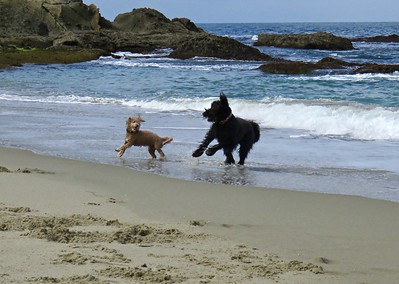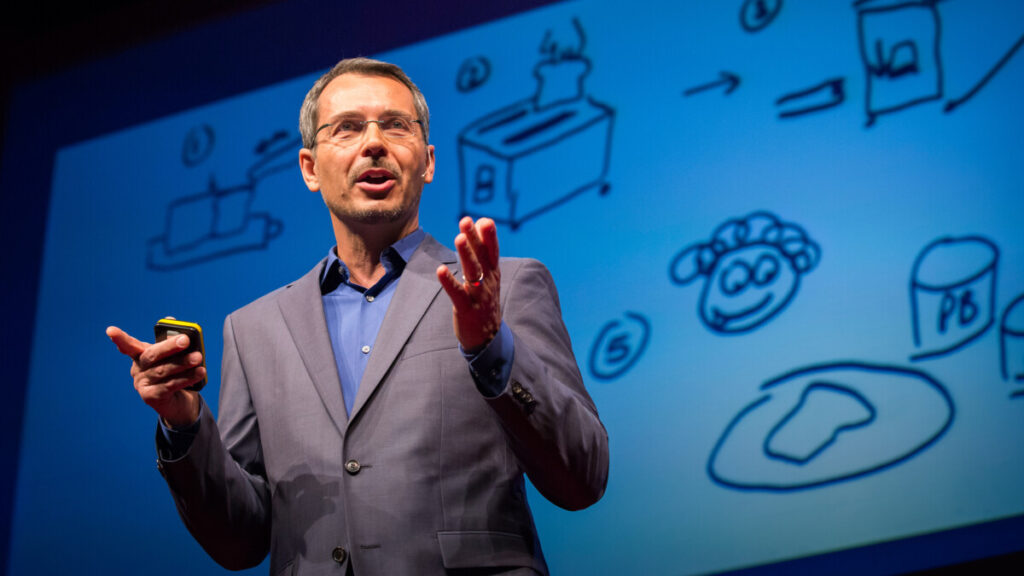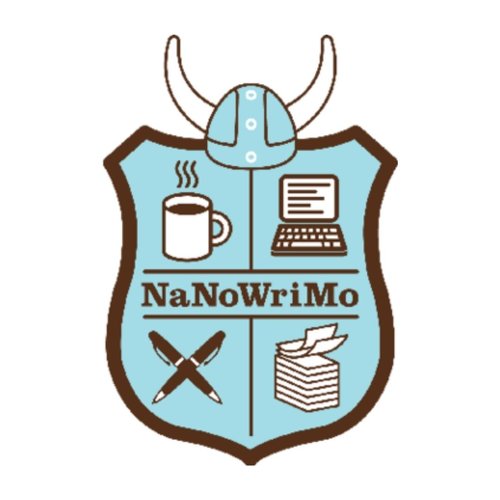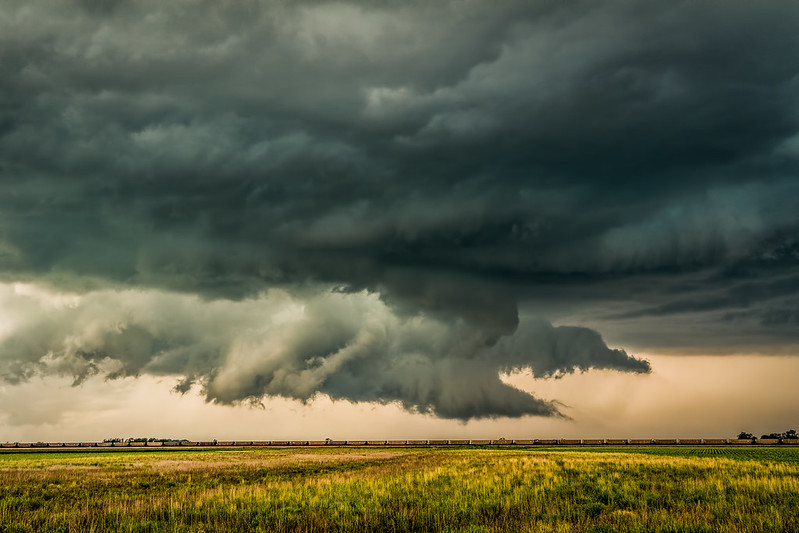Last Class!!!
I know it’s been a tough term and that everybody is glad it’s almost over. But you’ve all hung in there and made it through, so give yourself some congratulations, get final things done, go take a break… and get ready for Spring!
Here’s the Farewell Graffiti Padlet if you’d like to leave a parting comment or image.
As a reminder, what goes in the Final Portfolio is below as is the Final Course Grading scheme.
Also don’t forget: The Final Portfolio is due at the end of the day Monday, December 20.
And with that, as we say in the film business, is a wrap! Everyone have a safe, wonderful holiday.
Post class 12/13
Keep going on your Final Portfolios. And if you want a conference with me, sign up on the Conference Times Google Doc in our Google Drive.
What goes in the Final Portfolio folder. To make the folder, go to the main Drive, click on Final Portfolio folder, create a new folder with your name on it, and then put these things in it:
- Revision of the Unit 1 Education Narrative.
- Revision of your TEDTalk presentation (it can be the Google Slides or the written version of your Talk if that’s what you did).
- Revision of your Unit 3 post about Single Sources of Information.
- Final Reflection essay of 1000 words.
- Optional: Anything else you would like me to consider, like a blog post you really thought you did well, or some annotations from Perusall you thought were good and insightful. These things could help if you’re on the border between grades.
The Final Course Grading looks like this (note that the Grade that’s in OpenLab right now is subject to change once your revisions are done, so a low grade now can become a higher grade in two weeks, but also remember that a zero for your first draft can’t be replaced by a revision grade — it’s just not fair to people who have been working hard all term and submitting things to let someone turn in everything at the end and expect the same grade.):
- Unit 1 – Education Narrative, revision: 10 points
- Unit 2 – TEDTalk, revision: 10 points
- Unit 3 – Single Source of Information, revision: 10 points
- Participation (homework posts, Perusall annotations, in-class involvement in the activities we did, attendance. These can NOT be made up.): 20 points
- Final Portfolio broken down into:
- Final Revisions on the first three things on this list: 20 points
- Final Reflection: 30 points
Post class 12/8
We’re down to the last week (almost)! One-on-one conferences about revisions, and SFDs of the Final Reflection are what we have going.
Be sure to take a look at the Post class 12/6 Announcement below to remind you about what you need to do.
Homework for Monday 12/13: Write a SFD of your Final Reflection and upload it/post it in the Google Drive folder marked “Final Reflection SFDs.”
Post class 12/6
For these last two weeks, we’re working on your Final Revisions and Final Reflection for the Final Portfolio. The overall assignment is here (in the Unit Work section).
Here are the two Padlets that can help you with your Final Reflection:
- Padlet from the beginning of the term where you wrote A Letter To Your Future Self.
- Padlet where you talked about problems writing Unit 1.
Homework for Wednesday (there are two parts)
- Read and annotate on Perusall: “Thinking about Revision.” This is an piece by Donald Murray. Be sure to note favorite quotes because we’ll be using them in class on Wednesday.
- Write an Open Lab post of 250 words about what you need to do to create your Final Portfolio. You can base this on the freewrite we did in class, but go farther — review your work from this term and make notes on what you want to do to revise things, then talk briefly about what you need to do to revise things. Category: Final Revision ideas
FYI: On Wednesday, I’ll start setting up one-on-one conference times with people who want them. We’ll do them in class while everyone else is working on their Final Reflection and/or Final Revisions.
Also next week, for Monday you’ll be writing and posting to the Google Drive a rough draft (SFD) of your Final Reflection for Comments.
Post class 12/1
What we just did was an exercise in how to go from a down draft (where you get your ideas down in whatever order they happen to show up) to an up draft (where you get input from people to polish it up).
For Monday, everybody create your own post on OpenLab using the category “Information Sources.” Make sure it’s as close to an up draft as possible.
And also make sure it has a good conclusion — give us your bottom line on the whole idea of single sources of information, or tell us what we can/should do about it, or even leave us with a quote from somebody.
And, by the way, this IS your Unit 3 assignment, do don’t pretend it doesn’t count!
Starting Monday, we’ll be talking about the Final Portfolios… and this will be part of it. So be sure to get this done.
Post class 11/29
So what are we doing? Simple answer: you’re doing a “think piece.” That means you’re telling us what you think about how people get their information and why you think that. Which means you can do any number of things: You can make a claim, just give information, be confused, make suggestions. It doesn’t matter. What matters is the asking and the search for ideas and information.
Bottom line question — the thing that started all of this — is Adiche’s TED Talk. If she says single stories about people create stereotypes, my question is, where do these single stories come from? Where do people learn about other people and events? What’s wrong with people only looking at once source? What might be good about it?
What do YOU think? And if you get confused, that’s okay. That’s part of the process of figuring out what we think and having enough information at our fingertips to talk to other people about it intelligently.
The Google Docs should have ideas and links to articles and/or information that surprises or upsets you, or makes you think or wonder, or calls you to action.
And they’re for everybody to look at. There’s no secret to information — it’s out there to be shared.
Remember that we mentioned: YouTube, Reddit, TV news (cable, broadcast network, local), news websites (NY Times, Washington Post), Instagram, Twitter, Facebook, etc. So cast a wide net when looking for stories and opinions.
So for Wednesday, do a rough draft of a 750-word OpenLab post where you start to think through this. It can be very rough — we’ll workshop them together. And then for next Monday, you can make it a little more polished and tell us what you learned from doing it.
Call this the anti-research report.
Text me or email me with questions.
Updated schedule and due dates…
For 12/1: Write your longer (750-word) OpenLab post about single sources of news and information — what’s dangerous about them and why, or what’s not dangerous about that situation. Use images, and links, and whatever else you want to explain what you mean. Category: Information Sources
For For 12/6: Add a short introduction and conclusion to your post. Then copy the whole post over to the Google Drive Unit 3 folder (you can make it a Word doc or Google doc — it’s just so we can see them all together and comment more easily).
The Introduction — write a couple of sentences about what interested you about the idea of single sources of information.
The Conclusion — write a few sentences about what you learned from doing this. What do you know now that you didn’t before? What surprised you? What made you angry? What you think you could do about this in your own life?
Post class 11/22:
Reminder: The TEDTalk drafts including what we did in class today in the Chat is due in the Google Drive by noon 11/23 (tomorrow)! I’ll be sending it to Prof Standing.
No class this Wednesday 11/24
HOWEVER… what’s due on 11/24 is an OpenLab Post about Adiche’s “Danger of the Single Story” video we just watched.
And what’s due the following Wednesday (Dec 1) is a longer OpenLab Post about single sources of information and their place in our contemporary world.
And all that information is below…
Unit 3 —
For Unit 3, we’re going to circle back to things we discussed at the beginning of the term – how we learn what we know. And we’re going to take a bit farther.
We read an excerpt from Ellen Carillo’s article on the problems with Common Core as applied to reading and analyzing. Her point (it’s on Perusall if you want to look at it again) was that if we only look at what’s in the text without considering the larger context (or who the author is or who the intended audience is), then we’re not really understanding what the piece is about. And that’s dangerous. She goes on to say that this is how “alternative facts” and misinformation have grown since the 2016 election.
But we can make the argument that only looking at things from a single perspective has always been a problem. If we only get our information from one source, or only get our world view from one group of people, that can lead to some unfortunate attitudes and consequences.
So for this now-brief Unit 3 project, we’re going to take a quick dive into the danger of single sources, and use social media to do it.
The assignment: write a 750 word Open Lab post about the danger of getting information from a single source. Due Dec 1.
You can tell a personal story, or talk about a situation that’s happening that you know about, or pretty much any approach. You can use gifs, or images, or videos as well as text. But the main thing is that it needs tell us what the danger is and why it’s dangerous. You can talk about social media, or what’s called the mainstream media, or streaming services, or YouTube, or Facebook, or TikTok, or Instagram, or podcasts…. It’s completely up to you. But you’ll need to focus and really make it connect with us as your audience.
Category: Information Sources
Here’s the whole assignment and schedule:
- In class 11/22: Watch Adichie’s TEDTalk on “The Danger of the Single Story” (below)
- For 11/24: Write a short (150-200 words) OpenLab post where you talk about what you think is important about her talk and what part getting information from a single source plays in what she’s saying. Category: Single Story
- For 12/1: Write your longer (750-word) OpenLab post about single sources of news and information — what’s dangerous about them and why, or what’s not dangerous about that situation. Use images, and links, and whatever else you want to explain what you mean. Category: Information Sources
Post class 11/17
Nothing but trouble with the internet!!!!
So for Monday…
- Put your slide presentation together.
- Write your Talk, either in essay form or as an outline (I’m told that’s what y’all are doing to present in Prof Standing’s class, so that’s good for me!).
- You can put your outline/essay on the slide presentation if that works for you.
We’ll look at all of this on Monday to figure out the best way to get it to Prof Standing…
And remember: this talk is about information but with a connection to a larger idea — simple toys make us remember the importance of small things in a complicated world. The iceberg theory encourages us to look at other cultures, both what we see and what we don’t see, and increase our understanding of the other people that share our world. And so on…
Post class 11/15
Oh my goodness there are some WONDERFUL talks shaping up! Here are a couple of things:
- Remember what I said about set-ups — make us curious about your bigger message right from the beginning. It doesn’t have to be the title or even the first sentence. But get us wondering where you’re going or what this is going to be about and why it’s more-or-less important to us in 2021.
- And that means the last slide should pay off that set-up. Make the connection between your subject and the world we live in.
- Make it sound like you. Remember that you’ll be presenting these in Prof Standing’s class.
Again, have fun, teach us, challenge us, make us think about things in a different way, especially if what you’re talking about is something we already think we know something about!
Homework for Wed Nov 17
Get a decent if rough draft of your presentation in the Drive. It’s best if it’s a Google Slides presentation because we’ll be able to leave Comments that way. This doesn’t have to be polished by any means; just enough that we know the beginning-middle-end structure and the main idea that ties everything together and to us.
Something new…
I know there’s been a lot of confusion about these TEDTalks. So I made an executive decision today… which goes something like “to heck with it all!”
You all know what a TEDTalk looks and sounds like now. Fun, informative, challenging, dazzling, silly, provocative… and or all of this. But, the point is, you know what one is (you should — we’ve looked at enough of them!).
So…
…just go write one. Put it in a Google Slide presentation. Or a PowerPoint. Make it something to share with everybody else in the class.
About what? I don’t care. What you’ve been working on — OR — something else you just learned about or realized or understood or that happened in your world or to you or to someone else — OR — something you know how to do really really well and would love to explain to us.
Remember the little thing I did on animal assisted therapy? That all came out of my own experience and about an hour’s worth of research. (It’s posted in the Google Drive folder labeled Unit 2 – TED Talks btw.)
Do that. Or not that. Do your own thing. Do something you know enough about to pass as an expert, or at least pass as someone who’s learned enough to pretend to be an expert!
Mostly, just talk about it. Person-to-person. Make it fun. Make it you. Add as many images as you want. Explain something to us. Inform and enlighten us. Teach us about something we didn’t know about before. Bring it in from your own life if you want. If you want to make a larger point, go ahead. If you just want to dazzle us, that’s okay, too. All of that. Some of that. Something else entirely. Connect with us as people.
[FYI: For Unit 3, you’re going to take the same topic, information, attitude, whatever, and turn it into a new genre: a news article, a Twitter thread, a TikTok, an Instagram story, a video essay, a podcast where you interview someone or have a roundtable conversation or just record a personal essay you wrote about the topic (these need music and sound fx), a comic or graphic novel, an animated video, a series of infographics — the same information for a specific audience of your choosing (teens, older people, young adults…).]
But for now, enjoy yourself. Tell us about an idea of yours that’s worth sharing. Because that’s what will make us enjoy it, too.
HOMEWORK for Monday: Do a draft and stick it in the Drive folder labeled Unit 2 – TEDTalks. And don’t worry about the work you’ve already done: you can use some of it, all of it, none of it… whatever works. DO NOT BE STUCK ON WHAT YOU’VE ALREADY PREPARED. Bring fresh eyes. Be real.
Here are some more fun/interesting/dazzling TEDTalks.
This is Eric Whitacre talking about wanting to be a rock star, and ending up writing choral music… and putting together his virtual choir in 2010 (I showed you part of it).
Still in the music genre, here’s the R&B group Naturally 7 beatboxing an entire orchestra for one of their songs. This is so cool!
Here’s Chimamada Ngozi Adiche’s wonderful “The Danger of the Single Story.”
Hilarious TEDTalk about James Veitch’s weeks-long email conversation with a spammer.
And this the full TEDTalk from that crazy man, Clifford Stoll, talking about education.
Yes, some are a bit longer, but… well worth watching.
Post class 11/8
Pretty simple for Wednesday. And don’t forget… a full draft (shitty first draft, if you’d like) is due next Monday 11/15.
Homework for Wednesday
WRITE and upload to your Doc in the Google Drive folder labeled TEDTalks: Add your Body to the doc you already created. If you want to add images, do so! Always better with pictures, right?
For help… here are the template that Prof Standing and Prof Miller created last year AND the outline that I created from it. But remember… what’s due next week is NOT the outline — it’s the full draft of the talk.
Post class 11/3
We talked outlines and introductions today.
This website has the examples from TEDTalks about how to introduce a talk. The four suggestions are:
- Start a conversation
- Involve your audience
- Ask a question
- Tell a story
- Introduce your core message
As a reminder, here’s the Padlet with everyone’s topics. You need to add your answer to this prompt: How does this topic or my talk connect to the world we live in today?
So for next week, you’ll be finishing up your outline (remember that it isn’t the final version of the talk itself, it’s just a sketch of what you’re going to do) and writing the introduction which includes the introductory image and the text of what you’re going to say. I just did an extemporaneous thing (actually talked out loud!) and wrote it down, and that became my introduction (I also picked my first image and that gave me the way to introduce it).
Homework for Monday 11/8
- Finish your outline worksheet and upload it to the Google Drive folder labeled TEDTalk outlines.
- Write your introduction & upload it to the Google Drive folder labeled Unit 2 – TEDTalk. There are a number of ways to do this: 1) create a Word doc and upload it, making sure you have inserted at least one initial image, 2) start a Google Doc, making sure you’ve added at least one initial image, 3) start a Google slide presentation (the trick here is to realize this is NOT what you’ll show when you give your Talk — it’s just a place to put images and text as you write your Talk). You’ll be adding to this as you write the Body and Conclusion, and add images.
Just for giggles, I uploaded my outline and Google slide set (which is simply a very rough draft of a Talk) in the Main Google Drive Folder, in a folder labeled Jackie’s TEDTalk. I also had collected a bunch of images and put them in a folder on my computer.
BIG REMINDER: if you’re Googling for images, you have to go to Tools –> Usage Rights –> Creative Commons licenses for ones you can use. The library also has great help for images (go to the library, go to the research guides, find ENG 1101, and start searching).
Post class 11/1
Yay! Re-focus time!!! As I said, I’ll tell Professor Standing that I kind of messed up and that you’re all writing true information speeches, not problem-solving ones.
Here’s the Padlet with everybody’s Topics and answers to my questions.
So now that we’ve done a bit of re-focusing, and gotten started on your outlines…
Homework for Wednesday:
Do a preliminary outline for your TEDTalk. It doesn’t have to be complete by any means — you can leave sections blank or even write notes to yourself to go find more information about something. This is really meant to be a working document. Once you have it done in some fashion, upload it into the Google Drive folder labeled TEDTalk outlines. OR you can post it on OpenLab. It can either be the filled-in document itself OR it can simply be the resulting outline. Whatever will be helpful for you going forward.
Wednesday we’ll be talking about sources AND about Introductions.
Here’s the outline worksheet:
Post class 10/27
Well, we now all know what’s important for shipwrecks! I hope you enjoyed the little break…
…now back to work!
Homework for Monday:
Simple enough — Do two source analyses and upload them into the Google Drive either as a Word doc or by adding onto the bottom of the Google Doc you’ve already created. You can also start collecting image links and put those on the bottom of the Doc.
As a reminder, here’s how to write a Source Analysis. And… Happy Halloween!!!
About writing the Source Analyses
A detailed description is here. And this is a brief checklist for what goes in each Source Analysis:
- Bibliographic information and not just the url.
- Summary of main points (include a quote or two). No personal opinions!
- Rhetorical Analysis (no personal opinions. Just objective reporting of what you find.)
- Who the author is (credentials, publication credentials)
- Who the intended audience is
- The context. The context is not the purpose of the piece; it’s the larger social/historical context. For example, “climate change worries” is context; “teaching people about climate change and sea animals” is purpose.
- Purpose
- Discussion of language. Do they use pathos (emotion), logos (facts)? Is the tone humorous? Serious? Lots of jargon or not so much?
- Discussion of how visuals were used (color, arrangement, use of close-ups etc).
- Reflection
- Your personal opinion of what you read/saw – what you agreed or disagreed with and why, etc.
- What you learned/what surprised you.
- How this source might help you write/prepare your TEDTalk.
There’s a more detailed description half way down this page as well as example of a Source Analysis just below the description.
Post Class 10/25
Good work with Anne Leonard this afternoon. I’m putting two screen shots below from the Library site (here’s the quick link to the library is http://cityte.ch and the quick link to the login page is http://cityte.ch/sta).
The first one is the main screen (check the things on the left side to get to the English 1101 research subject guide).
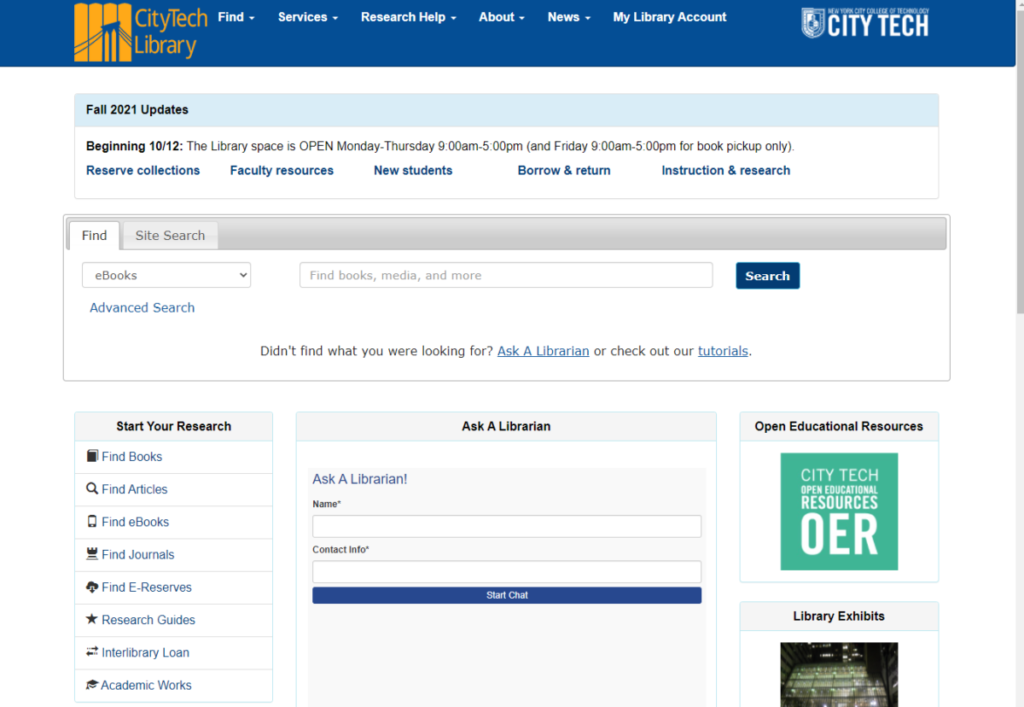
The second is the English 1101 Subject Guide screen; the left-hand list has the Research Current Events button that gets you to the NewYork Times, Washington Post, Opposing Points of View, and Statista. The YouTube videos are great to look at if you’ve forgotten how to do research in the library in general. You can also get to the Guide via this url:
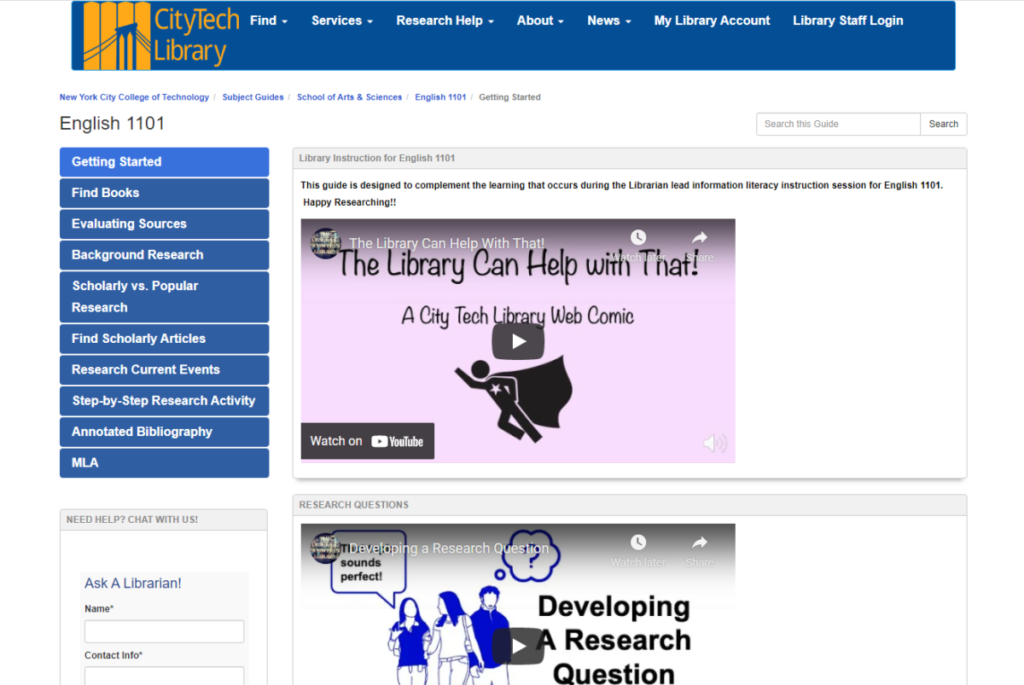
Anne also pointed to Wikimedia Commons as a great place to find images. Add your search term in the search box. Then when you get to the Search Media Screen, click on License, and select “Use with attribution.” You’ll get more images if you click on ones where you have to add the attribution, so be sure to capture the MLA information for the image.

And finally, she pointed us toward the Digital Public Library which is great for historical image and document research.
Now that you know how to use the CityTech Library to help you find sources — even if you’re adding to the ones you already looked at for your KWL+ worksheet — and how to find/work with images, it’s time to write your analyses of two sources and start building your image library.
All the information you need about how to write a Source Analysis is on the Unit 2 Assignment Sheet page.
So for homework for 10/27:
- Write your first Source Analysis (Bibliographic information, summary, 2-3 key quotes, rhetorical analysis, reflection).
- Upload it to the Google Drive –> Unit 2 – Reflective Annotated Bibliography. You’ll be creating a single document for both of your Source Analyses and your image bank, so either upload a Word doc (and open with Google Docs) OR create a new Google Doc to copy/paste your work onto.
- If you find some images you want to start banking, add the links to the bottom of this document.
Post Class 10/20
Here’s the link to “for the birds” if you’d like to look at it again.
Homework for Monday
FINISH YOUR KWL+ GoogleDoc.
Post Class 10/18
Good work by those of you who did the Homework for today and worked hard in the Group Discussion on the How to Speak TEDTalk.
Now we’re really shifting into thinking about and crafting your own TEDTalk… and that will include doing some research to help you make a great, compelling one. We’ll talk more about research — and how to generate good research questions –on Wednesday. But for now, it’s time to pinpoint your topic. There are some great things on the Padlet from last week if you need to go back and refresh your memory. But otherwise, let’s get going!
Homework for Wednesday:
WRITE a post for OpenLab: Write a blog post (250-400 words) in which you introduce your topic. You must cover all of the questions in bold:
- Why are you interested in this topic? Feel free to talk about your own personal experience with the topic, or to tell an anecdote about your experience with this subject matter.
- What are you expecting research to do for you in creating your Talk? Provide information and support for your ideas? Give you some new perspectives? Generate interesting/useful images? Give you good quotes?
- What will you do if you find information that goes completely against what you had expected to find? Will you throw it out? Will you talk about it anyway? Will you challenge your own assumptions?
- CATEGORY: Topics
Post Class 10/13
It’s TEDTalk time! Who’s up for a 30-day challenge? 🙂
For Monday:
- Pick one of the TEDTalks on Perusall. Here’s the list:
- Secrets of success in 8 words, 3 minutes | Richard St. John
- Looks aren’t everything. Believe me, I’m a model. | Cameron Russell
- How to heat your home without hurting the planet | Kathy Hannun
- How to start a movement | Derek Sivers
- The history of the world according to corn – Chris A. Kniesly
- How to speak so that people want to listen | Julian Treasure
2. Watch and annotate it. You can also take notes somewhere else. Doesn’t matter.
3. Download this worksheet and fill out in whatever way you want. You’ll be analyzing your chosen TEDTalk just like we did in class.
4. When you’re done, upload the worksheet (or a screenshot of it) to OpenLab. Category: Worksheet
FYI…
Here’s the link to Matt Cutts’ “30 Day Challenge”
Here’s the link to Camille Seaman’s “Storm Chaser”
Here’s the link to the James Baldwin clip
MAJOR CHANGE IN HOMEWORK FOR 10/13
I made a mistake. Sorry. Forget the Baldwin post here on OpenLab. I set it up as a response at the end of the Baldwin reading on Perusall, so do the Perusall response instead of the OpenLab Post. My apologies!!!
By the way, there are already some great responses on Perusall…
Post Class 10/6
Here’s the Padlet of ideas. Take a look — somebody may have an idea you hadn’t thought about. If you’re stuck, here are the prompts I gave to help you generate some more ideas. And remember — it can be serious or silly, just as long as you’re truly curious about it:
- What makes my heart sing.
- What I’m obsessed with.
- What I know a lot about and would like to share with others.
- What I’m really good at and would like to tell other people about.
- Someone I think people should know about and/or that I want to learn more about.
- A point in history that made a difference or that I find fascinating.
- What I’ve always been curious about but never took the time to investigate.
- What’s going on in the world that I’d like to understand better.
- What makes me really angry.
- The last couple of things I did serious Goggling about.
Here’s the link to the RBG video. And here’s the KWL+ process:
And here’s the Homework for next Wednesday, Oct 11 (no class on Monday).
READ AND ANNOTATE on Perusall: “A Talk to Teachers” by James Baldwin. There’s an Assignment response at the very end (it replaces the OpenLab post I mentioned last week; don’t worry if you’ve already done it – no harm no foul!).
WRITE a post on OpenLab: Go back to the ideas you jotted down on the Padlet and pick one to work on OR if you’ve thought of something new after reading the Baldwin speech (or having just had a couple of days to think about it), use that one instead. Pick one and ask a series of Journalist’s Questions about it: who, what, when, where, why, how. Generate as many questions as you can think of. Then do the same thing with a second idea. Once you get those two sets of questions done, create a Post and tell us:
- Your first idea. List all those questions.
- Your second idea. List all those questions.
- Two or three sentences about which one you’re leaning toward getting more curious about and doing some research on and why you’re most interested in that one. OR if you don’t like either of those first to, do a third idea-question set!
- The point is to let your brain go crazy! You’re not locked into anything yet — just getting closer.
- CATEGORY: Questions
Post Class 10/4
Again… the grades are in the GradeBook, drafts are out of 10 points, and final revisions aren’t due until the end of the term. Lots of time to meet with me or have a Slack conversation or meet after class. I’ve also put a copy of “The Tapper” on the Class Resources page to show you how to do a reverse outline.
And now we’re on to Unit 2, writing your TEDTalk in what I call the Curiosity Unit. We’re all about asking questions to learn about something we’re curious about and creating a TEDTalk to let other people know about it. Not to prove a point, not to make an argument, but just to inform.
Here’s the homework for Wednesday, 10/6
READ & Annotate on Perusall: The assignment labeled “Curiosity & Research.” There are two pieces here, so be sure to read/annotate both.
- Wierszewski, “Research Starts with a Thesis Statement”
- “Schools and Killing Curiosity” from The Guardian”
WRITE a blog post for OpenLab: Address these prompts in a post of at least 300 words:
- What is something you were interested in when you were a kid? Are you still interested in that topic? How did asking questions help you learn more about that topic?
- If so, how has your curiosity changed and grown over the years? And what role did the educational system play in your curiosity (good or bad)?
- If you are not interested in this topic anymore, what do you think happened to that interest? Do you remember the specific time you LOST interest? What did you become interested in instead (and why?)
- CATEGORY: Curiosity
Post Class 9/29
A couple of things:
Here’s the Padlet. Go take a look at what people said about the problems they had writing this Education Narrative. It’s always good to know we’re not the only one having these kinds of issues!
Remember that Unit 1 is over on Monday (meaning I won’t look at any Perusall comments or OpenLab posts for this unit after Sunday night). So be sure you post your SFDs in the Unit 1 folder in the Google Drive by Sunday night..
Here’s the Homework:
note: I’ll leave my Comments in the margins of your draft and also put a longer note at the very bottom. You can wait to write your Revision Memo until I’ve done that.
WRITE and add to the bottom of your Education Narrative Draft: Write a note to yourself (and to me) labelled “Revision Memo” that includes these things.
- Summary of what people responded to, the good and the bad!
- The recurring comments you got, and how you think you can address these in general.
- The comments you disagree with (or that people disagreed with each other about), and whether you think there’s any merit to them. If you do, talk about how you think you can address them.
- Brief thoughts about what you want to do in your revision (remember: the final revision isn’t due until the Final Portfolio at the end of the term).
BE SURE you’ve commented on three other people’s drafts. I’ll be keeping track as part of your Unit Participation Grade, so be thoughtful about it. Positive feedback (plus helpful notes).
And as always, if you have questions or need help, send me a text on Slack.
Post Class 9/27
Sorry Perusall went all wonky. That’s a good article to skim through, especially Practice 2 and beyond. So if you’re wondering more about how to write positive feedback/notes, take a look at it.
Here’s the Homework for Wednesday:
WRITE in the Google Drive folder: Use the Comment feature to leave feedback on two more Education Narratives. Be sure to read their Reviewers Memo before you read their essay, then add Comments on the side — you can use these prompts to get you started, but write whatever you want, remembering to be positive and helpful!
- I liked (….) because…
- I got this from reading your work.
- I found this part interesting because…
- I got confused here because…
- I wanted to know more (….) about because…
At the very end (below their Reviewer’s Memo), leave the author a brief note that summarizes what you wrote in the Comments on the side. It doesn’t have to be long; just something to let them know your overall reaction and maybe ideas about revising if you have any (that’s optional). And don’t be formal about it! Talk to them one person to another, like you’re texting or chatting (but with cleaner language).
Post Class 9/22
First I have to say I love the paragraphs that have been posted. Some really interesting stories that could turn into great essays.
Second, the length on these drafts should be about 800 words so we can see enough to know what you’re doing. Mostly, just write about yourself and what you’re thinking, and we’ll see where we are next week.
Third, here’s the whiteboard where I put down two different ways to structure these education narratives (this is actually from my morning class but it’s the same information): 1) framed by ideas and supported by personal stories, and 2) framed by a specific incident and supported by the chronology of how the person got there. Hope it helps!

Finally, here’s the Homework for next Monday. Don’t struggle with the Reviewer’s Memo: it’s just meant to give you a chance to say what you wanted to do with your essay, what you think is working or not, and what feedback you’d like from other people. Add it to the bottom of your draft when you’re finished with the draft (which, by the way, only needs to be 800 words — we’ll get to 1000 by the end of the term).
And, as always, ask me questions on Slack!
WRITE and add to the end of your SFD: Reviewer’s Memo. This short Reviewer’s Memo (100-200 words) is something you add at the very bottom of your draft. It’s written to your classmates (and me), and addresses these three things:
- This is what I intended to do: Here’s why I wrote it. What I hoped it would do. What I want people to take away from the piece.
- This is how I feel about the project so far: how I think it’s going, what problems I’m having, what I think is working, and what I think I need help with, what I’m proud of, etc.
- This is what I really could use feedback about: what do you think is working? What is confusing? Does each paragraph address a single idea, or does it wander all over the place? Should/could I mention or use something from the readings? If this were your essay, what would you do next?
WRITE and upload to the Google Drive folder labeled Education Narrative: A Less Shitty First Draft of UNIT ONE (including your Reviewers Memo at the end). At least 800 words. Pay attention to your paragraphs (more than one, but then whatever — even one sentence can be a great paragraph!).
Post Class 9/20
I hope everybody enjoyed the writing activity we did. It’s really a great way to create scenes whether for film or book or video game narrative.
We’re getting ready to write the Education Narrative, and this is good practice. Maybe you even wrote something you can use!
Here’s the Homework for Wednesday, 9/22:
WRITE a post on OpenLab: Write at least two distinct paragraphs to use in your Education Narrative. They can describe one specific incident that changed your views on education using Concrete, Significant detail. Or they can be your first take on the introduction plus one paragraph describing an incident. It can be what you came up with in class or even something else that occurs to you. Doesn’t matter. Feel free to use/review what we talked about for PIE paragraphs (that slide show is on the Class Resources page under Help & Tutorials).
- Category: Paragraphs
READ and annotate on Perusall: “SFD” by Anne Lamott. You don’t need to write anything on Open Lab because we’ll be using it in class on Wednesday.
Post Class 9/13
Good work on those scavenger hunts. If you have time and think about it, take a look yourself — everybody obviously has access to these docs because they’re on the Google Drive (you get to it by clicking on Google Drive up on the top menu).
REMEMBER: No class on Wednesday!
Here’s the homework for next Monday, Sept 20:
READ & Annotate on Perusall: Olivarez, “Maybe I Could Save Myself by Writing” and his poem “Mexican American Disambiguation”
READ & Annotate on Perusall: Barry, “Tardy.”
WRITE on OpenLab: (250 Words) So far in this unit, we have read (and heard) three examples from the genre of the “education narrative.” Your first essay assignment in this class will be to write in this genre yourself. So in this discussion forum, I’d like us to have a conversation about what the features of this genre are. Please discuss some of the following:
- What, from what you’ve seen so far, are the “ingredients” (also known as “conventions”) of the education narrative genre?
- What do you think might be a place to get started with your own education narrative?
- What are your questions or concerns about writing an education narrative of your own?
- If you like, you can also feel free to share an educational experience you had and ask for feedback from your colleagues (and me) to see if we think that might be a solid place to begin writing.
- CATEGORY: Conventions
Post class 9/1
I hope everybody got some useful information about yourself and your own writing process when we did the Google Docs. I’m going to put them all into a single folder labeled “Writing Is…” in case you want to look at them again.
Text me or email me with questions about the upcoming homework and/or the Unit 1 Assignment. These are always really interesting because you’re telling stories!
Have a great short break!
Homework for Sept 13 (don’t forget, no class 9/3-9/8)
READ and annotate on Perusall: “Thoughts after reading Ellen Carillo.”
READ and annotate on Perusall: Tan, “Mother Tongue.”
optional: annotate the Jamilla Lysicott spoken piece
POST in OpenLab: As a blog post (at least 300 words) in which you write about these two things:
- How do you feel about what Carillo is saying? Did you ever get the feeling when you were in school that you were only allowed to accept what someone wrote? That you couldn’t have your own response to it? How did/does that make you feel? In addition, have you ever thought about the difference between “knowledge” and “understanding”? Why would that be important in today’s world?
- Now that you’ve listened to/read Lysicott and Tan, write about your own experience with various “Englishes.” How has your experience been similar to Lysicott and/or Tan? Please be specific and use at least one quote from Tan or Lysicott in this part of your response.
- CATEGORY: Englishes
Post class 8/30
Ya’ll did a LOT today! Commenting on Introductions, playing with three types of text on Perusall, playing with Padlet. Deep breath…
Here’s the homework for Wednesday (I’ll also copy this and put it on Slack in the #from-prof-blain channel):
READ and annotate on Perusall: “How to Read Like a Writer” by Mike Bunn. Annotate the heck out of this thing! Do exactly to Bunn’s piece what he’s asking you to do: question why he wrote something a certain way, comment on whether you think it’s effective or not, respond to his questions. If someone has already highlighted a sentence, just click on the highlight and add your own comments — make it a conversation!
WRITE and Post on OpenLab: Follow up on your annotating by writing a brief post that discusses the following questions.
- Mike Bunn writes, “You are already an author.” He’s talking to you. What do you think he means by this? What are some of the things you write already? (Yes, we talked about this a little in class, but now’s the time for you to talk about it from your own life. And by the way “Nothing” is not an acceptable answer.) Think of all the ways you already use words in your everyday life. That’s authorship! How will that existing expertise help you in your college reading and writing career?
- Was there anything you noticed in Bunn’s article that yo u would like to try to do in your own writing? What, in particular? Please be specific!
- How did you feel reading and annotating like this? I know it seems time-consuming, but what did you learn about reading and writing this way?
- CATEGORY: Bunn
If you have questions about anything, email me or text me on Slack (feel free to DM if you want, or if it’s a general class question, you could just drop it into the # general-questions-comments channel.
Update 8/25:
So nice to “see” everybody today! First days/weeks are always odd, but it was wonderful that you all showed up ready to work. And the Padlet is wonderful!
The Homework is below (same as it was before class) — take a look at the Syllabus in Perusall (annotate if you want to), and create a post for OpenLab that introduces you to us!
If you need help with any of it, check the Tutorials, Help & Resources -> Class Resources area or text me on Slack.
Welcome to class!
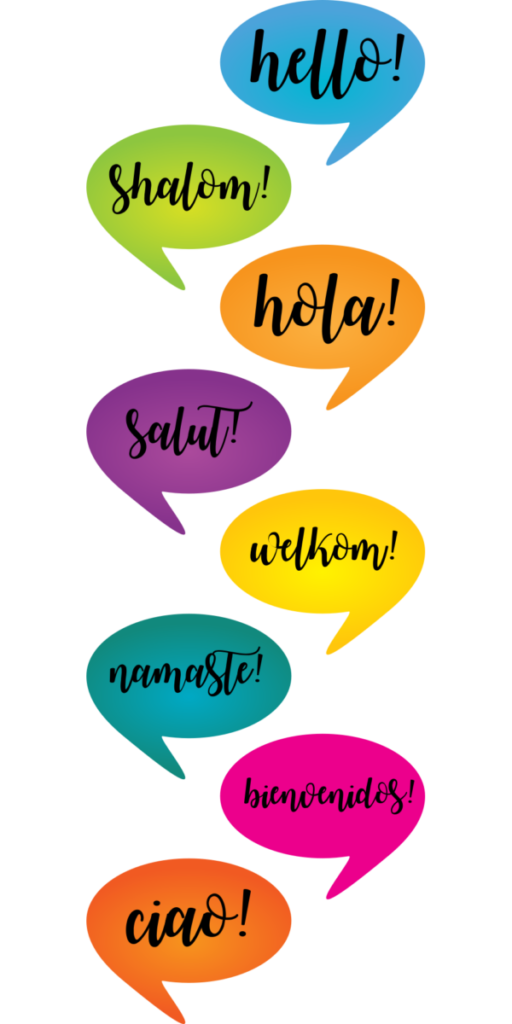
We are starting fast… Day One of the Fall Term. New platform to replace Blackboard. Whew!
Don’t worry. We’ll walk through this together and it’ll all be fine.
Here’s a quick welcome video for people looking at this site before the term starts. But I’ll save most of what I want to tell you for the first day — August 25, 2:00 pm, on Zoom: https://us02web.zoom.us/j/81661822445?pwd=c252enRGWHVHVVY1dlAzMGVGdU80dz09
There’s actually some homework for the first week — August 25 – August 29. So here’s the schedule of what we’ll be talking about AND the two assignments:
Week 1 (August 25-29)
Wed Aug 25
Intro to class. Walk around the site. How to post in OpenLab. Housekeeping: Slack, Perusall.
- Slack: Here’s the Slack invitation to join again. So join and say hello in the #general-comments-and-questions channel.
- Perusall: You can wait until we meet the first time to join, but if you’d like to get a head start, go to perusall.com, register using any email and password you want (doesn’t have to be CityTech), check your own email. When you come back to Perusall, click on I am a student to join, and enter this code: BLAIN-V36UF. Then you can go to the course and take a look around. (There’s also a video that the English department made for you about how to sign up for and use Perusall, and why it’s important. It’s on our Class Resources page under Tutorial, Help & Resources.)
HW for Aug 30:
READ on Perusall: Look at the Syllabus, but don’t do any annotating. We’ll be playing with it in class.
READ: these two short “Tips” pieces
- “Tips for Online Learning Success” https://www.nhcc.edu/student-resources/online-learning-d2l/tips-for-online-learning-success
POST on OpenLab an introduction to you – with image. Create a new post. Here’s the link to the Class Resources page which has a how-to video (and a downloadable handout to go with it) for how to create a Post.
- Start with one word that describes how you’re feeling about this course as we get started (it could be the same one you mention in class). No need to explain that word, but you can if you want to.
- Next, talk about your worries, concerns, reactions to class and/or to the “Tips” readings… whatever you want. No censoring (except for keeping it more or less clean).
- If you think you might have some technical issues about being fully online this term, add that here, too. That will help you and me both!
- Then tell us a little about yourself: major, where you came from if you’d like to tell us, that kind of thing.
- AND add an image that means something to you, and explain why you chose it (why it means something to you).
- AND and tell us a little about the story of your name. Who gave it to you? Is it a family name? Part of your culture? Do people treat you differently because of it? Are you proud of it or do you with it was something else?
Category: Introductions
- CHECK BACK IN and see what other people are saying, and reply to a couple of people. It’s nice to know we’re not alone!
Once you get that done…
…you’re free to take a look at the materials for Unit 1 – Education Narrative, which we’ll go over on August 30 at our regular class session.
I’ll probably say this 4000 times this term, but if you have questions, send me a message on Slack (here’s the invitation again if you’ve lost it), or send me an email DBlain@citytech.cuny.edu.



